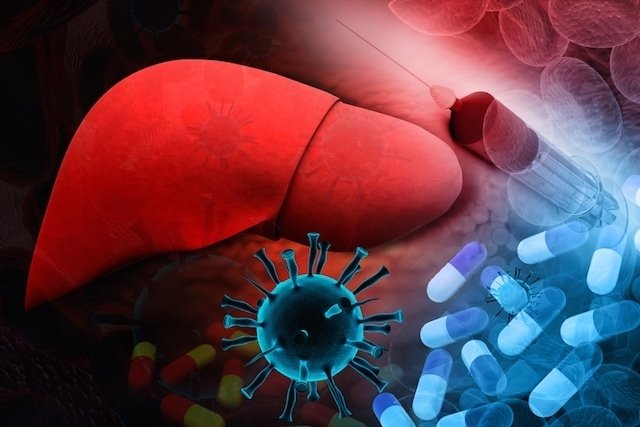Treatment for hepatitis varies according to its cause, that is, whether it is caused by a virus, an autoimmune disease or frequent use of medications. However, rest, hydration, good nutrition and suspension of alcohol consumption for at least 6 months are normally recommended to prevent further damage to the liver and speed up the recovery process.
Furthermore, it may be recommended to suspend medications that the person is taking, even if this is not the cause of hepatitis, as during the disease the liver is not able to metabolize medications correctly, resulting in greater production of toxins and further harming more the organism.
In more serious cases, it may be necessary for the person to remain in the hospital to be monitored, being released when the disease is more controlled, but treatment must continue at home.

Hepatitis A
Hepatitis A usually resolves after a few weeks, with the doctor recommending rest, a diet low in fat and carbohydrates and drinking plenty of fluids. Furthermore, it is recommended to avoid the consumption of alcohol and medications that can harm liver function.
One of the symptoms of hepatitis A is a lack of appetite, which worsens at the end of the day, therefore, a good intake of liquids and solid foods should be ensured throughout the day. Intravenous feeding is necessary in the acute stage when the patient has persistent vomiting and is unable to maintain oral intake.
Isolation of patients with hepatitis A in a single room and bathroom is only necessary in cases of fecal incontinence, which is rare.
Hepatitis B
In the case of acute hepatitis B, the treatment recommended by the doctor is rest, a balanced diet, suspension of alcohol consumption for at least 6 months and the use of medicines to alleviate symptoms, such as vomiting and fever, for example, if they are present. In the case of chronic hepatitis B, the treatment recommended by the doctor is the use of medicines such as Interferon and Lamivudine, which must be used as directed.
Isolation of patients with hepatitis B in a single room and bathroom is only necessary in cases of massive and uncontrolled bleeding, which is rare. Learn more about treatment for hepatitis B.
One of the ways to avoid infection with the hepatitis B virus is through vaccination, the first dose of which must be given within the first 12 hours of life.
Hepatitis C
Treatment for hepatitis C must be carried out in accordance with the guidance of the hepatologist or infectious disease specialist, and the use of injectable Interferon alfa associated with the oral medication Ribavirin is normally recommended. any effect related to the use of the medication.
Despite the adverse effects related to the medicines used in the treatment, a cure occurs in 50 to 80% of cases when the treatment is carried out correctly. Furthermore, it is important to have a proper diet to avoid further damage to the liver. See in the video below what the hepatitis diet should be like:
Hepatitis D
Hepatitis D treatment is carried out in the same way as for hepatitis B, as the hepatitis D virus depends on the hepatitis B virus to replicate. Therefore, it is important to rest, follow a balanced diet and avoid consuming alcoholic beverages. Learn more about hepatitis D treatment.
As the hepatitis D virus depends on the hepatitis B virus, prevention of this infection must be done through the hepatitis B vaccine. Find out more about the hepatitis B vaccination.
Hepatitis E
Hepatitis E is normally resolved by the body itself, without the need to take medication, it is only necessary to rest, drink plenty of fluids and have an adequate diet. In more serious cases, which is when there is co-infection with the hepatitis C or A virus, for example, the use of antiretroviral medications may be recommended. Find out everything about hepatitis E.
Hepatitis F and G
Hepatitis F is considered a subgroup of hepatitis C and to date no cases have been described in humans, therefore there is no established treatment. In the case of hepatitis G, although the virus can be found in people, especially those with hepatitis C, B or HIV virus, treatment is not yet very well established, and it is important to consult a hepatologist or infectious disease specialist to define the best therapeutic strategy. .
Autoimmune hepatitis
Treatment for autoimmune hepatitis involves the use of medications that reduce liver inflammation, such as corticosteroids or immunosuppressants, such as Prednisone and Azathioprine respectively, which should be used according to the doctor’s instructions.
It is also important that a person with autoimmune hepatitis has an adequate diet and avoids consuming fatty foods and drinking alcoholic beverages. See more about the treatment of autoimmune hepatitis.
Medicated hepatitis
In the case of medicinal hepatitis, treatment is carried out by suspending or replacing the medicine responsible for liver damage, and must be carried out under medical supervision. It is also important to drink plenty of fluids to speed up the body’s detoxification process and treat any complications that arise until the liver is repaired and regenerated, often requiring a transplant.

Sign up for our newsletter and stay up to date with exclusive news
that can transform your routine!
Warning: Undefined array key "title" in /home/storelat/public_html/wp-content/plugins/link-whisper-premium/templates/frontend/related-posts.php on line 12
Warning: Undefined array key "title_tag" in /home/storelat/public_html/wp-content/plugins/link-whisper-premium/templates/frontend/related-posts.php on line 13



